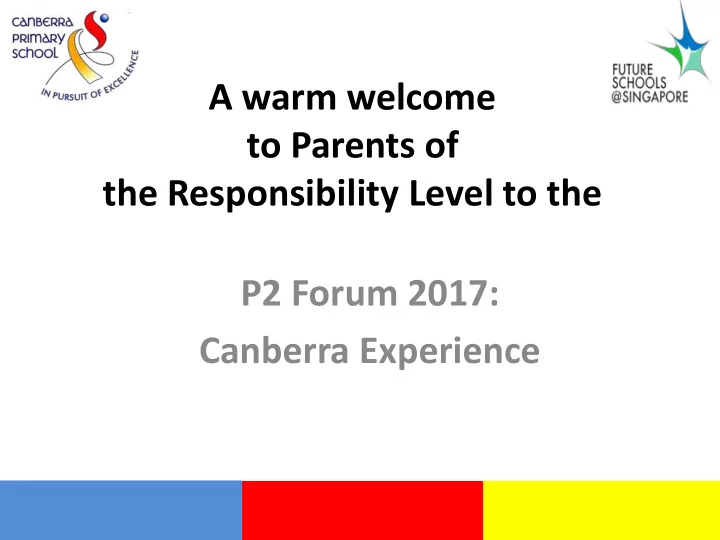

Oral – Stimulus-based Conversation 1. Use vivid vocabulary and correct language 2. Develop response A nswer R eason E xperience
Parental Support Look out for guidelines in oral booklets Practise the examples with your child Record Voice
Parental Support Look up meanings and pronunciations with dictionary apps
Parental Support Fiction Non-Fiction Chapter Books Provide books • of different genres eBooks are • interactive and include audio functions eBooks Watch English • Audio Books programmes
Primary 2 Mathematics
OVERVIEW • P2 Mathematics Topics Statistical Whole Numbers Picture Graphs Numbers to 1000 Geometry Addition and Subtraction Shapes and Solids Multiplication Patterns with Shapes Division Measurement Money Length Fractions Mass Addition and Subtraction of Fractions Volume Time
APPROACH • Teaching of heuristics
APPROACH • Teaching of heuristics Heuristic Skill P 1 P 2 Number Pattern Act It Out Draw A Diagram Model Drawing (Fill in model) Guess and Check (by drawing)
• RICHES- infused POLYA’S 4 Step Approach 1) Understand the Problem R • Read the question I • Identify what is ‘asked’ C • Concepts or topics 2) Devise a Plan H • Heuristic Skills E • Examples seen • Strategies taught S 3) Carry Out the Plan 4) Look Back • checking for reasonableness of answer
• P2 Mathematics Assessment Assessment Content Duration Weightage Term 1 - Practice Term 1 45 minutes 0% Paper (0%) Term 2 Performance Topical Term 1 – 45 minutes 25% Task (20%) Term 2 (5%) Term 3 Performance Review Term 1 – 1 hour 15 35% Task (30%) Term 3 minutes (5%) Term 4 - SA Exam* Term 1 – 1 hour 30 40% (40%) Term 4 minutes Total 100% *SA Exam : Semestral Assessment Examination
Faculty 1 Programmes and Events – Learning Support Focus Financial Math Trail KooBits Mathematics Remediation Literacy (LSM)
Financial Literacy Programme • Curriculum Infusion • Young Savvy Spender Saver Card
English Math Art FTGP Music Manage Learn to make and Save relating to the use of monies Spend Understand the of Share his/her means
Young Savvy Spender Saver Care Responsibility Self-Discipline Teamwork Innovation Excellence
KooBits Challenge Engaging the Digital Kids. All topics aligned to the latest MOE maths 10,000+ problem sum questions for your child syllabus to practise Detailed video lessons in each topic for Step-by-step solutions with necessary models self-learning & diagrams
“ I become a learner because I find myself in a community of learners.”
Pupils’ thoughts and comments…
How Parents Can Help Read Encourage children to make good use of the Coursebook and online platforms like Koobits and LMS Refer Provide opportunities to generate interest in Mathematics Practise Provide opportunities to help relate math concepts to daily life Reinforce Strategies learnt in school
ICT Tools for Learning Personal Learning Learning Device Management System (PLD) (LMS) Values of Self-directed Collaborative Learning Learning Learning
LEARNING MANAGEMENT SYSTEM (LMS) Asknlearn
LMS as a Learning Tool SOME FEATURES OF Learning Content for English, Pupils’ THE LMS Mathematics & Mother Portal Tongue Self-Directed Learning School Based E-Learning LMS Parents’ Academic Portal Modules Parents’ Survey Travel Declaration Meet the Parents Scheduling
Link & Login Info Website: http://lms.asknlearn.com/canberra_ps/ User ID: Your child’s BC Number Password: Your child’s BC Number
Step by step guides will be made available on the school website
Baseline ICT Exposed to 4 sessions of 1 hour ICT baseline lessons ADOBE Video iBrainstorm SeeSaw Sparks Show and Tell Creative Writing Oral & Picture Discussion
Cyber Wellness
What is Cyber Wellness? Positive well-being of Internet users Understanding of the correct and appropriate use Understanding of the risks of harmful online behaviour Awareness of how to protect oneself and other Internet users
Some Popular Social Media Sites Content Sharing sites Social Networking sites Messaging apps
Managing Potential Online Risks M A N A G I N G R E G U L A T I N G o n l i n e r e p u t a t i o n t i m e a n d a c t i v i t i e s D I S C E R N R E S P E C T inappropriate content intellectual property
PHYSICAL EDUCATION
Agenda • CPS PE Syllabus 3 E Approach Progress Card • CPS CCA Program Introduction P2 Interest Groups
PE Syllabus in CPS new PE syllabus by MOE 2016 CPS revamped its PE SOW to align to the new PE syllabus. – Structured – In-Depth – Fun and enjoyable
Holistic Education: 3 E approach Expose | Experience | Enrich Conceptualisation Foundation Consolidation Application Teaching & Learning / Programs / Events P1-P6 Sporting/ P3-P6 School P1-P6 PE & P1P2 Cultural Events Representative Aesthetics and CCA for Competitions PAL Curriculum Activities & Performances
Assessment in PE With the PE Progress Card: • Monitor their learning • Receive feedback on skills they have done well and skills that they can improve. • Transparency on overall PE grade.
CPS CCAs for pupils from P3 onwards
CCA Program
CPS P2 Interest Groups
Purpose of Interest Group Sessions 1) To expose P2 pupils to different CPS CCAs 2) To allow the pupils to realize their potential for various CCAs
Interest Groups • Term 2 – Aesthetics and certain clubs and societies • Term 3 – Sports and certain clubs and societies • Through these sessions, pupils who displays great interest, and certain levels of attainment, will be given options (consent forms provided) to be allocated to certain CCAs when they are in P3.
PUPIL WELL-BEING
STUDENT DEVELOPMENT @CPS Student development aims to build a culture of care in the school which is conducive for holistic development of the pupils. We strive to provide pupils with a safe and disciplined learning environment so as to enable them to have opportunities to engage in quality learning experience and to acquire values to support lifelong learning and their well-being.
Recommend
More recommend